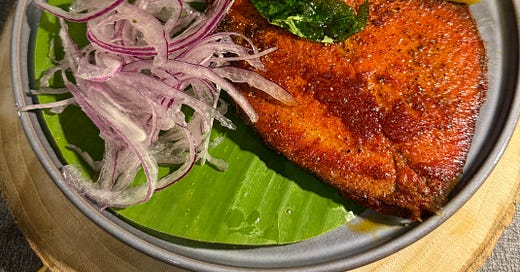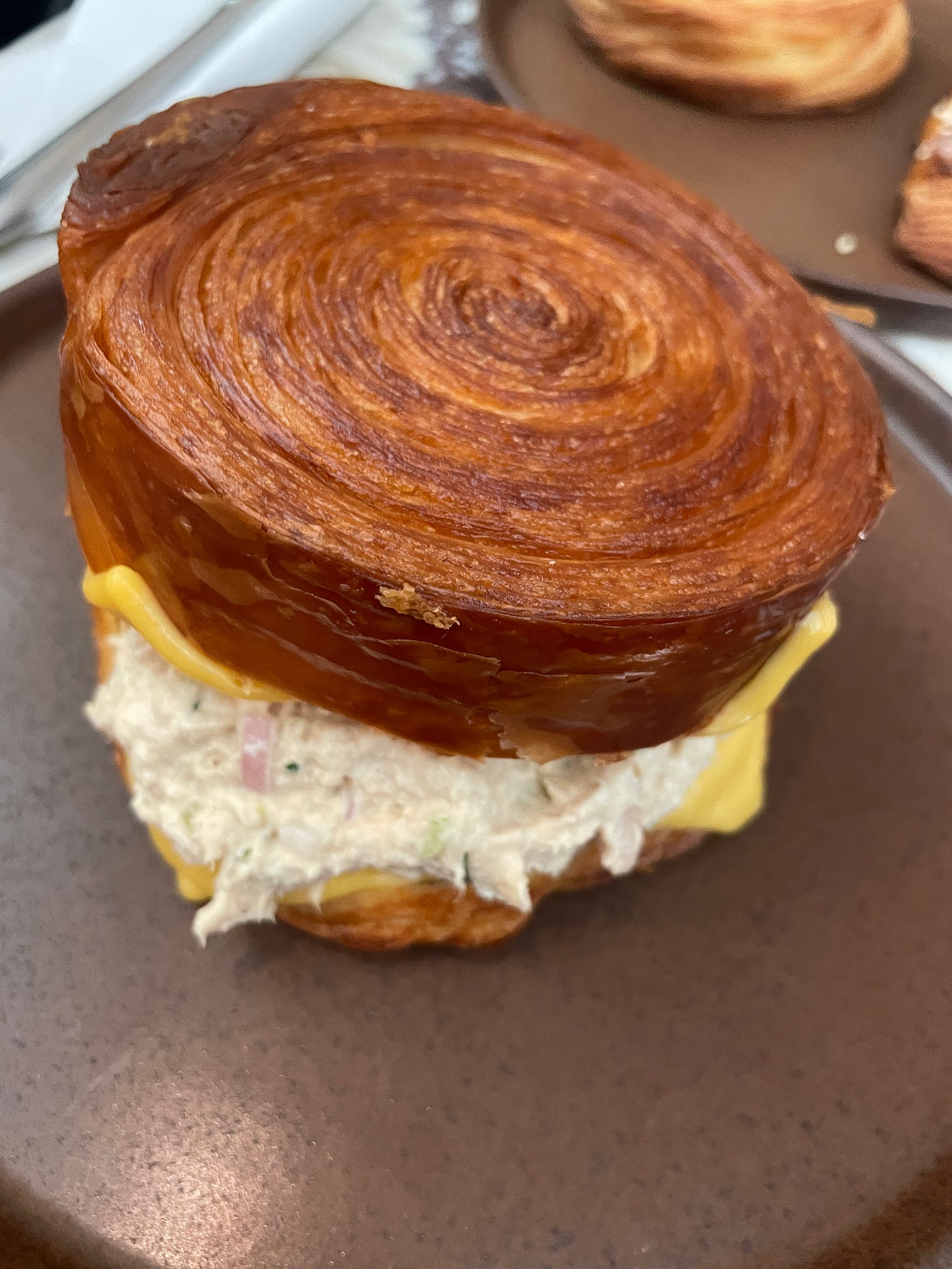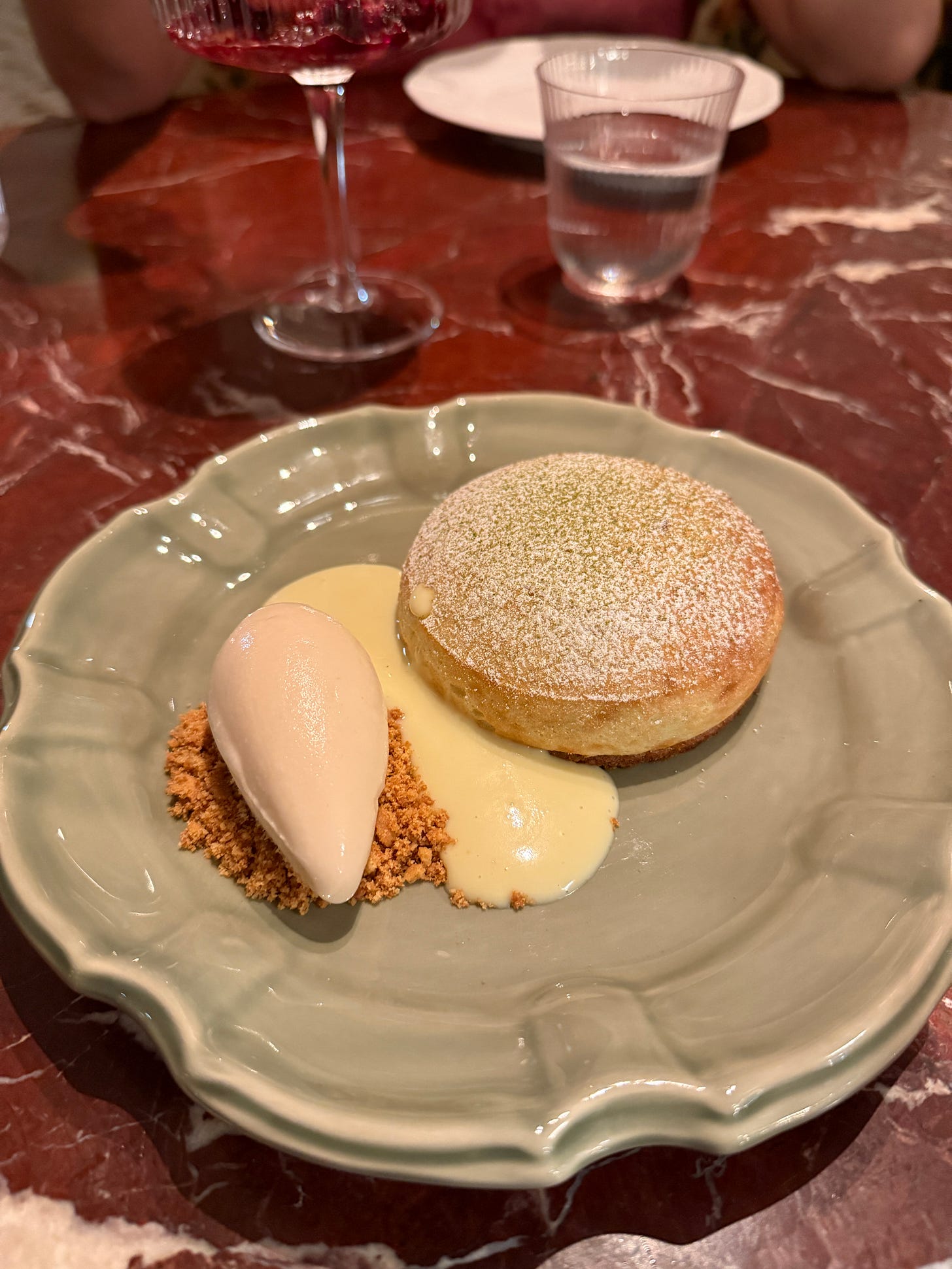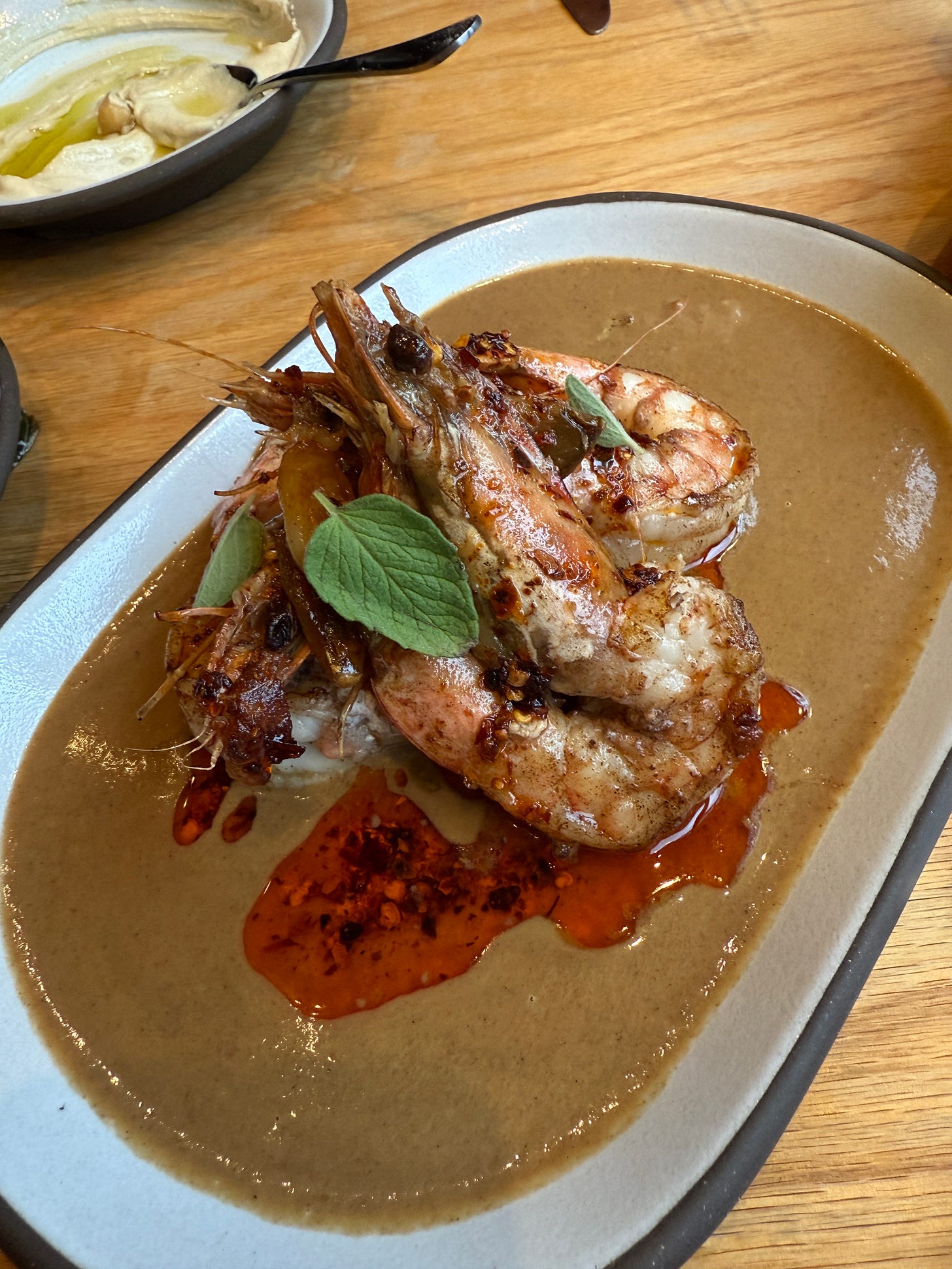#40: The discomfort you're avoiding is the whole point
Singing lessons are teaching me how to navigate jealousy
A couple of weeks ago, I was at a cool APIHM party with a bunch of swaggy asians with impossibly cool style, and I somehow became the designated karaoke scapegoat. I thought this was going to be a group effort, but each person mysteriously developed stage fright after singing a verse, and because my body language read as not shy in the moment, the mic kept boomeranging back to me.
Then some chaos agents put on Whitney Houston’s “I Have Nothing,” a song I love to sing, but off key in a big group, four margaritas deep. Together we all sang:
Don’t let me close, one more door. I don’t wanna hurt, anymore🎶
But for whatever reason everyone went silent right then, leaving me to screech:
Stay in MY arms, if you dare, or must I imagine you there🎶
These are notes reserved for people who can actually sing, and I did not appreciate being left to hit that high note by myself. I scanned the room expecting secondhand embarrassment and found…absolutely nothing. People were either encouraging, or engrossed in their own conversations. I think a past version of me would’ve been drowning in shame, but I’m at a place where I feel like my singing voice isn’t good or bad. It just exists.
I have felt this shift the last few times I did karaoke but also in many other aspects of my life. Just a sensation of being really present and accepting instead of doing damage control on every part of my existence.
I see this same pattern showing up everywhere in my life: learning to swim as an adult, working with a voice coach who makes me sing like I’m having an existential crisis, and processing feelings around a partner’s new romantic connection. I know this might sound like a leap to make, or kinda woo woo, but I see a clear through-line. Discomfort isn’t something just to get through, it’s the whole point.
People run away from polyamory because they're worried about jealousy, and I trust that people know themselves well enough to know if something is right for them. But what's missing from the conversation is that so much of life is about discomfort. Why would you default to avoiding it entirely when life's best parts often come precisely because you endured a period of discomfort?
I had this same realization when I finally learned to swim as an adult. I used to be embarrassed to admit that I couldn’t swim, but less so when I learned it’s quite common for people of color, especially from immigrant and low-income families, to never learn. Couple that with my city upbringing without easy access to bodies of water, and you just get someone who simply never had the opportunity.
My swim instructor told me I was the most afraid of water he had ever taught. He said this without judgment and what I took as a neutral observation, so I didn’t take it personally. It was just data. What became evident from my lessons was how desperately my body wanted to stay in familiar states. The water represented everything my nervous system was designed to avoid: no solid ground beneath me, no predictable next step, and no guarantee I’d be okay.
Tensing up was my body’s default response to uncertainty, but tensing up was completely antithetical to floating. Even when I technically knew the motions and was physically capable of floating, that visceral discomfort with the unknown would take hold and I’d overthink myself into a panic. The pool had a lifeguard, and my instructor was right beside me, so this was objectively a low risk environment. But my body didn’t care about logic.
It took 9 one hour lessons, but I finally stopped fighting the water for a little while and just let it hold me. It was only when I stopped trying to control every variable and allowed myself to exist in the space between solid ground and drowning that floating was something that could just happen naturally. I just had to stop working so hard against it.
My voice coach operates on the same principle. When I sought out singing lessons after that Whitney Houston moment with the swaggy Asians, I found someone who is just as philosophical about vocals as I was getting about discomfort. Our first lessons weren’t about hitting the notes correctly. They were more about unleaning shame.
She had me singing like I was yawning, then deliberately nasally, then from my chest and again high pitched. Then she had me sing the lines but silently, mouthing the words as though sound would come out but stop just short of being audible. These exercises might’ve been to expand my range, sure, but I think more than that they were meant to strip away self-consciousness. You can’t be precious about how you sound when you’re yawn-singing on purpose. Whatever sound that came out wasn’t an indictment on me as a person. It’s just breath moving through my body in different configurations.
The deeper work involved recognizing that all my life experiences have shaped my voice. Every moment of being told a feminine voice wasn’t to be taken seriously, every instance of feeling like I wasn’t assimilating to American culture well enough or that my voice betrayed my emotions— my voice had absorbed all of it. She helped me tap into sounds from my chest, legs, and my nose. I don’t know if this makes sense, but when I sing now I can feel vibrations traveling through parts of my body I had not consciously connected to my voice before.
With both swimming and singing, I had to stop trying to manage every outcome and just trust my body already knew what to do. The shame and overthinking were the real obstacles, and not my technical ability.
So this brings me to the most complex application of this principle. I’ve been watching one of my long term partners develop a romantic connection with someone else. I’ve written about jealousy before but it’s a topic I can tackle from so many different angles, but this particular situation is teaching me something new about the relationship between discomfort and growth.
Their new connection is romantic and not sexual (for reasons I won’t get into for their privacy) and this initially felt more threatening to me than purely physical encounters. My brain could rationalize sex as just bodies doing what bodies do, but romance implies something deeper. Something that could compete with what we have. I found myself wondering why he would continue pursuing this connection without the sexual component, given how important physical intimacy is to him. So this connection must be pretty special.
Here’s where I recognize my body wanting its familiar state again. Certainty about where I stand, guarantees about outcomes, control over variables I can’t actually control. The anxious part of me wanted him to map the emotional territory so thoroughly that nothing could surprise me. I could feel myself wondering things like whether he’d come back from a date with her and realize Im deficient in some way she’s not.
But as with swimming and singing, overthinking was the problem, and not the situation itself. When I caught myself spiraling, I reminded myself of something from my own experience. I’ve had multiple meaningful simultaneous romantic connections over the years and developing feelings for one person has never made me love other partners less. Love is not a finite resource, even though our culture treats it as one.
This is where non-monogamy differs from monogamy. In monogamous relationships, there’s inherent competition. If your partner develops feelings for someone else, it does threaten the exclusivity that defines your relationship structure. In non-monogamy, the structure already accounts for multiple connections, so the fear isn’t about being replaced. Instead the real concern becomes about whether you’re partnered with someone who approaches relationships and people thoughtfully. You want to be with someone who sees people as complex, full human beings and not just collections of traits to compare against each other. If your partner is the type to think “oh, she’s funnier than you” or “she’s more adventurous, so now I prefer her,” then maybe you have a fundamental compatibility problem that has nothing to do with relationship structure.
My cousin, who is newer to polyamory, recently told me he’s concerned that inherent to this relationship dynamic is that his time will inevitably be divided so he can’t deepen in his relationships. To which I said: is there a world in which monogamous couples exist where one person occupies all your time with no room for friendships, hobbies, work, or other interests? If so, I don’t think that’s a healthy relationship because it sounds like codependency. Time was always going to be divided among the things and people that matter to you, and the question is whether you’re dividing it intentionally or pretending that romantic love exists in a vacuum.
When I stop fighting against the reality that any of my partners will make room for other people in their lives, I can feel a genuine happiness about my partner’s happiness (compersion). If you’ve ever been happy for a friend because they made a new good friend that has nothing to do with you, you’ve experienced compersion.
And as I wrote about before in my jealousy post last year, it’s not that jealousy disappears. It’s just that one can experience it without being controlled by it. Just like I could feel afraid of water while still learning how to swim, I could feel territorial about my oartner while simultaneously being grateful that he gets to experience this sweet romantic connection. The feelings don’t cancel each other out.
I’m really hoping this through-line makes sense. Discomfort isn’t the bug, it’s the feature. It’s not something to rush through because the discomfort can really transform you. I was talking about this with some friends last weekend and my friend Andrew, who teaches jiu-jitsu, talked about how the biggest obstacle in learning how to fight is “getting the yips”— that moment where your brain takes over and you freeze up instead of trusting your training. My friend Jess offered that the same lesson is applied in her archery lessons. She’s been learning how to breathe, leaning into the uncertainty, and trusting in the process even when her mind is screaming at her to control every variable.
The muscle that you’re building isn’t pain tolerance. It’s the ability to stay present with uncertainty. Try to exist in the space between having no idea what’s going to happen and familiarity without needing to collapse the tension immediately.
It’s not that discomfort is noble, it’s just simply where the growth and change happen. Ask me about my singing lessons, btw. I’m about to be absolutely insufferable.
Going to skip this section this week because I’m collecting questions for an audio advice episode featuring my anchor partner Louis. Please send me your q’s— comment below, reply to this email, or text me if you know me. You will get to hear my voice in action.
This short doc produced by the NYTimes ft. 3 women who speak to each other’s moms about their decision to not have children. My mom actually told me she doesn’t want to be a grandmother so by some miracle I am not being pressured to have kids but I was still captivated by this.
E. Alex Jung is an excellent profile writer and I actually got to talk to him about his process in a writing class he led to raise money for Gaza last year. Here’s his profile on Zohran Mamdani who I didn’t know has a Gen Z artist wife.
A good take on polyamory (tiktok vid) being no messier than monogamy. They can both be messy.
A croissant tuna melt from new Williamsburg bakery Birdee, a fish fry from Sri Lankan UES spot Lungi, a coconut chiboust from Haitian French upscale eatery Maison Passerelle, and tiger prawns in garlic confit from Lebanese hotspot in Park Slope, Sawa.












Loved these reflections on the emergent properties of discomfort 🌱 🪴